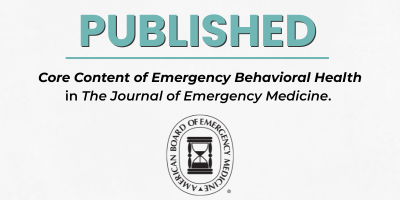
Dear Colleagues:
We know how busy you are and wanted to address your questions about the Continuing Certification Agreement. With the launch of MyABEM, many of you noticed the Agreement again, and some were understandably unsure why you were being asked to sign it. We appreciate the opportunity to provide more information.
We want to reassure you that the Agreement is not new. It has been part of ABEM Certification for decades. The recent request to re-sign came only because we transitioned to MyABEM, and minor updates were made to the Agreement in 2023.
We are grateful for the time and effort you devote to certification. We aim to make the process transparent, fair, and supportive of you as emergency physicians. Thank you for being so committed to patients and the specialty and for maintaining the highest standards of practice.
With appreciation,
James D. Thomas, MD
ABEM President
What is the Continuing Certification Agreement and why are physicians asked to sign it?
The Continuing Certification Agreement describes an ABEM-certified physician’s continuing certification requirements through ABEM. The basic purpose of the Agreement is to advise ABEM-certified physicians regarding their responsibilities as ABEM Diplomates, to describe conditions that could affect their ABEM certification status, and to obtain their agreement to fulfill these responsibilities.
Certified physicians are required to sign this Agreement once. They are only asked to re-sign it when changes have been made to the Agreement. All current ABEM-certified physicians have previously signed the Agreement in the former portal. However, as noted below, with the transition to the new portal and in light of the minor changes that were made in 2023, we are asking physicians to re-sign the Agreement.
American Board of Medical Specialties Boards have similar certification agreements that physicians are asked to sign as part of their certification process.
How long have physicians been required to sign this agreement?
The Certification Agreement is not new and has been signed by physicians seeking to continue their ABEM certification in some form since at least 1989.
Acknowledgement of the Agreement became an online process in 2004, and ABEM began electronically archiving the responses in May 2012. Physicians were required to sign this agreement every year until 2019 after which physicians only need to re-sign the agreement if it is revised.
Why does the Agreement look like a new form on the ABEM website?
This summer, ABEM migrated to a new physician portal, MyABEM, to enhance security and improve accessibility. Within the MyABEM portal, the Agreement’s appearance when physician’s first activated and signed into their MyABEM account may have implied that this was a new agreement. The ABEM Board of Directors and staff apologize for any confusion that this display caused. The agreement is — and should have appeared — exactly like the one with which physicians are already familiar.
Why is there a ‘Release of ABEM’ clause?
This clause states that physicians waive bringing suit against ABEM based on their disagreement with an ABEM decision related to certification activities, such as eligibility determination, exam development, administration, and scoring, as well as decisions to deny or revoke certification. This clause does not apply to lawsuits initiated by physicians for other reasons, such as anti-trust.
The purpose of this clause is to help ABEM keep fees to physicians at reasonable levels. Lawsuits against certifying bodies can be expensive to defend, even when unsuccessful. Without this clause, those costs would be passed on to ABEM certified physicians. The provision that ABEM may seek reimbursement of legal fees from plaintiffs is also to ensure that costs are not passed on to ABEM certified physicians.
Notably, similar provisions have been upheld in at least three litigated cases against Member Boards of the American Board of Medical Specialties. These provisions are required by several other certifying Boards.
Does ABEM have a due process for physician concerns or protests about their exams? What happens after a physician discusses a concern about a case during the oral exam and new Certifying Exam?
Physicians may request an investigation into the conduct or administration of any ABEM exam. Concerns should be raised immediately at the test site (Pearson Vue, virtual Oral Exam, or the AIME Center for the Certifying Exam), or submitted in writing within 10 days of the exam or 15 days of score release.
For the current Oral Exam and the future Certifying Exam, physicians may also speak with ABEM physician leadership at the exam’s conclusion. Concerns are documented and reviewed by ABEM physician leadership, including video review when applicable. A decision is communicated within 90 days with the right to appeal.
Appeals proceed first to the Certifying Examination Committee then, if needed, to the Executive Committee. At both stages, physicians may participate in an informal hearing with the Committees. As with any new exam, the appeal procedure is under review in anticipation of the start of the Certifying Exam in 2026. While the ABEM Board of Directors will continue to make the final decision and physicians will be able to have an appeal panel hearing, other revisions to the review and appeal process may occur.
How does ABEM ensure fairness and reliability for the Certifying Exam? What if a physician gets a harder (or tougher) scorer vs. another physician?
ABEM is committed to fair and reliable examinations. Examiners receive rigorous training to apply scoring criteria consistently, and case audits ensure scores reflect physicians’ performance. Physician leadership monitor cases live and by video, addressing any concerns and excluding flawed scoring elements or cases if needed. They also provide feedback on errors with examiners directly and help examiners adjust their performance to meet standards.
All exams undergo statistical analysis to adjust for examiner variability and detect unusual scoring behavior. Exam physician leadership strives to ensure that physicians are getting fair and equal treatment during the examination. Clinically active emergency physicians who volunteer to participate in the process help set the passing score for an examination. New exams use these standard-setting processes, and future exams are psychometrically equated to maintain consistent, fair standards.
How often does the Agreement need to be signed?
The Agreement is signed once. Re-signing the agreement is only necessary if the agreement changes. The agreement was last updated following the 2023 Board of Directors meeting, where the language was streamlined. However, these changes were not published until now to coincide with the launch of the new MyABEM online system, requiring all physicians to re-sign once they sign in. As of mid-September, over 30,000 physicians have activated their MyABEM account and signed the agreement.
Who do I contact with additional questions?
We are here to support you. If you have additional questions, please contact Stay Certified at staycertified@abem.org or 517.332.4800, option 2.



